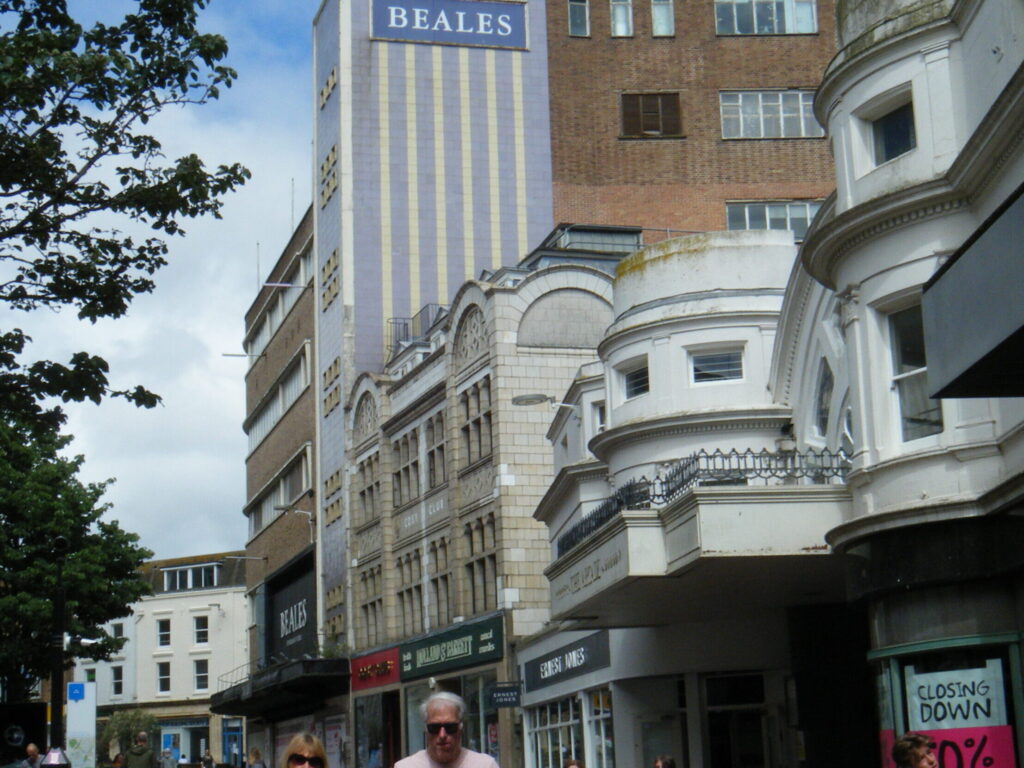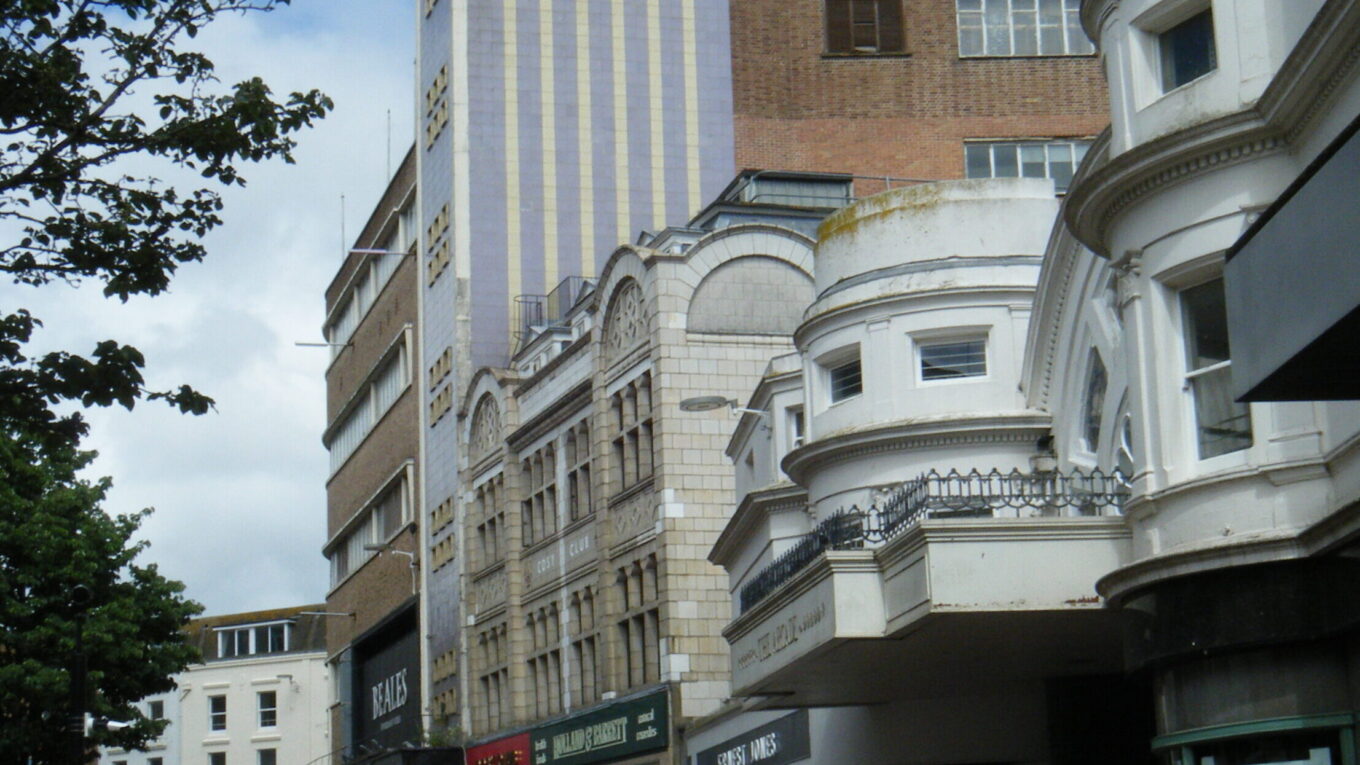Bournemouth’s High Street today: are department stores a thing of the past?
Bournemouth has a vast Highstreet and, on its tourism website, is described as a ‘bustling high street with familiar chain retailers as well as boutique independents and department stores’. Bournemouth seems to have it all, to please any shopper. Examples of well-known department stores included TK Maxx, House of Fraser, Primark. The list goes on. But in recent years its stores seem to be slowly vanishing.
Covid-19 will always come to mind as an obvious answer to why our highstreets are declining. Since the 11thof March 2020 when the pandemic was officially announced our lives have no longer been the same. From wearing masks, isolating, lockdowns, PCRs, Lateral Flow tests and vaccinations. Lockdown led to online shopping becoming the new craze, and with next day delivery, and autofill payments, are we losing the need to spend a shopping day out with friends. Bournemouth University makes up a huge part of business for Bournemouth high street and with lockdown and universities closing this business simply disappeared. Now, with things opening back up, and our lives going back to some normality will Bournemouth’s high street be reborn or become a thing of the past?
Bournemouth employees: working with the pandemic
BBC news provided an article in 2020 interviewing store workers and discussing the effect of the pandemic on their business. Neelam Kumari, who works in a phone accessory store, explains that people no longer come to the high street to shop, but instead just for a day out. She stresses how important the university is for her business, and how online shopping is slowly taking over. It seems our outlook to shopping has changed, where it used to be efficient to go out and browse, we seem to have become used to staying in, and doing our shopping from behind a screen. In the middle of the pandemic, the hot climate brought people’s attention to Bournemouth’s beaches, but no longer taking a browse in the highstreets shops, like they once may have done. Steve Cox, a taxi driver, discussed the closure of night clubs having a massive effect on his business. From this you can imply how closure of night clubs would’ve affected chain food stores. Bournemouth Town Centre Business Improvement District launched a “spend local, stay local” campaign, and has promoted town centre gift cards. Looking at this attempt now it didn’t seem to have much effect when looking at the closures which occurred during covid, and the amount of store to let, leaving empty shop windows.

Stores closing, new stores arriving: what has changed and why?
Empty stores are now dotted throughout Bournemouth high street, and these are not only independent stores, but well-known stores such as Debenhams, Topshop and Yo! Sushi. Some stores to never reopen again after the pandemic. Topshop went completely online, closing all its stores. Online shopping seems to be the main factor which is taking out any market for our stores. A survey showed in 2020 the biggest turn-offs among visitors was the number people sleeping rough (64%) and the cost of parking (59%). So, the outlook of the high street itself and its accessibility also effects peoples want to go out and shop. If the high street isn’t to a certain standard, why wouldn’t people resort to the comfort of their own homes to shop instead? It seems like the appeal of the high street is changing, browsing and not buying seems to be the new norm, for Bournemouth high street to thrive again, its main strength seems to be food and beverage. Clinton Cards and Bootmaker were both replaced by easily accessible restaurants. Bournemouth’s high street may survive, but it will no longer have its busy shoppers like it once did.
Saving Bournemouth’s High Street
Bournemouth high street, as we all know has not been the only high street effected by the pandemic. Online shopping is clearly not the only problem, as things open again people still aren’t seeing much appeal to go out and shop, is it losing its appeal as a form of leisure. The decline of the high street raises fundamental questions about what a town centre is actually for, what makes a town centre ‘successful’, and what sort of social and economic functions we wish town centres to perform. Improvements don’t appear without funding.
Insight from an Employee
An interview with a former employee of Beales and a current employee of Marks and Spencer’s from Bournemouth discusses her experiences. Josie Sharpe discusses how Beales’ products were more traditional and expensive. Its website was outdated and hard to navigate. She discusses the importance of online shopping today and how important its accessibility is. Keeping up with the trends of today are an important part of a store’s success. Her outlook on Bournemouth is that it is more of a place for tourists to visit, but no longer a place to shop. The diversity and buzz come from the university. Josie also remarks on the attractiveness of the high street declining. A common trend which seems to arise, is that the community of Bournemouth, whether they are a worker or a consumer of the high street, no longer see it keeping its standard.
Sources used and further reading:
George, Maya. “Readers react to the closures in Bournemouth town centre”, Daily Echo, 1 February 2020.
Kefford Alistair. “‘The death of the high street’: town centres from post-war to Covid-19”, History and Policy, 5 June 2020.
Ping, Sarah. “How Bournemouth high street’s empty shops could bounce back thanks to lockdown”, Dorset Live, 26 July 2021.
Shearing Hazel. “Coronavirus: ‘Thousands came to Bournemouth but the town was dead’”, BBC News, 20 July 2020.
Websites on related topics:
Official Bournemouth Tourism Website, https://www.bournemouth.co.uk/shopping

